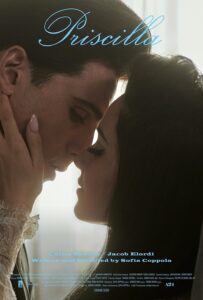
Priscilla
When Priscilla Beaulieu met Elvis Presley she was fourteen and had never dated anyone. He, on the other hand, is the rock’n’roll star, with the world and women at his feet, but he has recently lost his mother, he is homesick for the United States and wonders if that world will still remember him once it’s over military service. The king confesses her vulnerability to the little girl in her heels, puts his head on her shoulder, calls her back, invites her to Graceland, marries her. Priscilla becomes the princess of a fairy tale, only in this story, her story, she has no say.
Sofia Coppola brings Presley’s wife’s autobiography to the cinema (written with Sandra Harmon) to tell the version of Priscilla, the other side of the golden record, which also includes the chapters of loneliness, jealousy, renunciation of minimal autonomy that would have come from doing a job, of the request – completely mutual – to always be there for him, dressed and coiffed as he likes, respecting his times, his passing passions, the final will of the Colonel who gives him acts as manager and demiurge.
Her story had remained in the shadow, eclipsed by the dazzling icon of her husband, and Coppola makes that shadow the stylistic feature of the film: always a little obscured from a photographic point of view, because Priscilla lives behind the drawn curtains, in the deprived of the bedroom, far from the sets, inside the car (and the only time that, as a child-girlfriend, she plays in the garden with the dog, she is immediately sent back into the house).
Elvis is tender, in love with her, and needs her, but Priscilla is still a prisoner, of that dream and of that time: this is Sofia Coppola’s version, who rereads the starting subject making it the story of an emancipation female.
In adopting a univocal point of view, however opposed to the official narrative, something inevitably remains outside the picture and it is an absence that weighs heavily.
In fact, if the director is very good at bringing the viewer back into the body and restless spirit of a fourteen-year-old girl (of any era), and in telling her transformation into a woman through the use of detail, it is unfortunate that this brings with it the reduction of the figure of Elvis to that of a slightly imbecile, long and diluted boy, ultimately good, but capricious and superficial. There is almost no trace of her music, due to rights issues.








